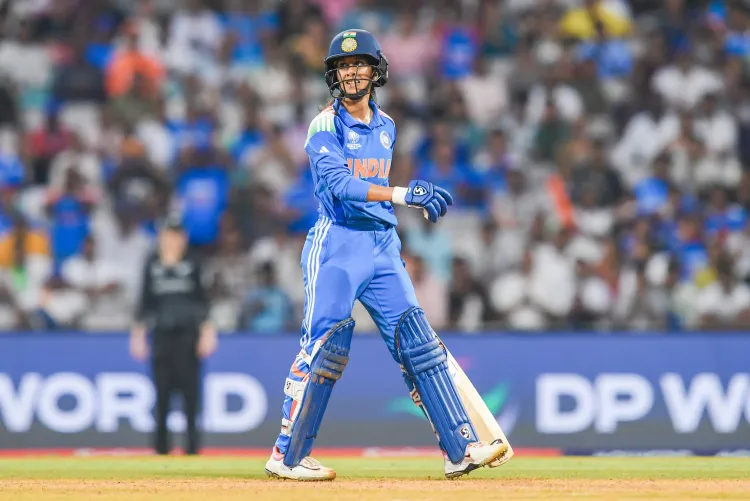Did Jemimah Overcome Pressure to Shine in Key Match?

Synopsis
Key Takeaways
- Jemimah Rodrigues showcased resilience by bouncing back from earlier setbacks in the tournament.
- Strong support from her coach and family helped her regain confidence.
- Her performance highlights the importance of mental strength in sports.
- Adapting strategy and preparation can lead to success under pressure.
- Setbacks are temporary; how one responds defines their character.
New Delhi, Oct 24 (NationPress) With the pitch at the DY Patil Stadium in Navi Mumbai being favorable for batting, it was expected that Smriti Mandhana and Pratika Rawal would establish a strong foundation for India’s significant 53-run victory over New Zealand with their dazzling centuries.
However, another vital component in India’s strategy for posting a robust score of 340/3 in 49 overs was local talent Jemimah Rodrigues, who came in at number three and scored an unbeaten 76 off 55 deliveries. In this match, Jemimah transformed her World Cup storyline—following two ducks and a loss of her place in the playing eleven during the tight four-run defeat to England in Indore.
As India secured their semi-final position in front of a record crowd of 23,180, it also marked Jemimah’s return to form, as she achieved the fastest fifty for India in this tournament in just 38 balls. Witnessing Jemimah excel with the bat filled her long-time coach, Prashant Shetty, with immense pride and joy.
“It was fantastic, and she performed excellently right from the beginning. It never seemed like she was under significant pressure or felt her position was at risk after being dropped previously. She played with complete confidence from the first ball, maintaining good momentum and adapting to the situation well,” Shetty stated in an exclusive conversation with IANS from Mumbai.
Before her unbeaten 76, Jemimah’s World Cup journey faced challenges—two ducks, scores of 32 and 33, and when the Indian team opted for a sixth bowler against England, the right-handed batter found herself sidelined from the eleven. Shetty, who has coached talents like Yashasvi Jaiswal, Prithvi Shaw, and Arjun Tendulkar, recounted Jemimah’s emotions after being omitted from the match against England.
“In terms of mindset, she was disheartened. Naturally, during her preparations, she was eager to score runs for the team and play a crucial role in achieving victory. She entered the tournament with that mindset but never imagined she would be dropped,” he explained.
“That setback felt like a dream shattering. She was quite upset as she struggled to regain her confidence, feeling it was hard to accept that her performances led to her exclusion. Overall, it was a significant setback for her,” he added.
The criticism directed at Jemimah for being dismissed while attempting a sweep shot was swift and unyielding. In her moment of disappointment, Jemimah’s support system—comprising Coach Shetty and her parents, Ivan and Lavita—worked cohesively to reassure her that her journey was not over and she could still play a pivotal role in the upcoming match in Navi Mumbai.
Over time, Jemimah’s support system has functioned seamlessly—Shetty would first communicate with her parents, and if he mentioned something, they would carry that dialogue forward with her. Similarly, if her parents provided advice, Shetty would continue the conversation in the same vein with Jemimah to ensure she received consistent support.
"Our discussions revolved around what is within her control. We didn’t convey to her that she was out of the tournament. Instead, we emphasized that she could return to the playing eleven at any time and help India win, as we remained very much alive in the tournament.”
“I advised her on two things: to prepare thoroughly and to approach her preparation as if she were playing the next match. There’s no point in worrying about whether she would play or not, as those thoughts are beyond her control. Just focus on preparing well for the game," he elaborated.
"The other point was that whenever she got the chance to bat, she should play compactly first. This is crucial because, following a setback, it’s tempting to overexert due to nerves—like trying to hit a boundary right away. But she must be fully aware of how to approach the early moments and what tactics to employ."
"We concluded that she should focus on playing compactly at first. After that, she could adapt her play according to the situation. This was our advice—to prepare meticulously and not dwell on her previous omission. She should deliver her best and leave the rest to fate," he explained.
When she came in after Smriti’s dismissal, Jemimah recognized the need to maintain the momentum, especially since the team management had sent her in ahead of Harleen Deol. It was a substantial challenge, but Jemimah rose to the occasion.
"This was part of the strategy. You’ll notice she defended the first ball properly. Then, she defended the third ball as well. It’s easy to step out and start playing aggressively, but the fear of failure looms large—hence, starting well became crucial for her," he noted.
She took six balls, including three singles, to settle in. Once the boundaries started flowing, there was no looking back for Jemimah. Her drives became her most productive shot, while she skillfully maneuvered the field against spinners with her trademark sweeps and reverse-sweeps, demonstrating that Jemimah was back to her best.
"She also played many ground-boundary shots, which I found striking. One more point we emphasized was that when she steps onto the field, her body language, walk, and demeanor should convey that she is not still affected by her previous exclusion," he added.
“She should carry herself with the confidence and personality that Jemi possesses—so embrace your persona and just play. After that, whatever happens, just go with the flow," he concluded.
This was surprisingly just the fourth innings at number three for Jemimah, who was once seen as a natural successor to Mithali Raj’s position in ODIs due to her similar style. On the day she scored 76 not out off 55 balls, adorned with 11 boundaries, Jemimah exemplified the essence of resilience and recovery, especially during emotionally turbulent times.
“This innings defines her greatly because it encapsulates the many ups and downs. You enter the tournament with ambitions of performing well, especially at home, but an initial failure can be disheartening. Recovering from such setbacks is challenging. Regardless of the messages we share, it’s a setback,” Shetty remarked.
“Following that, being dismissed again on the same shot brings immense criticism, and subsequently being dropped is a tough pill to swallow. The range of highs and lows she experienced speaks volumes about her character. Her mental balance throughout this ordeal will be a lasting lesson in her life,” he stated.
“Setbacks are a universal experience. However, how one bounces back defines their character. Yesterday, I witnessed Jemimah discover a new aspect of herself—one that demonstrates she can recover from any setback and succeed in overcoming challenges," he added.
As India advances to the semi-finals, they do so with a batting lineup that appears more adaptable, thanks to Jemimah’s impressive performance at number three. “As the saying goes, some events unfold when they are meant to. This decision was excellent and worked remarkably well."
“She has now provided the team management with the option that she can perform well at number three. Her performance shows that she can bat well even after the 35th over or from the 10th or 12th overs. Moreover, we are peaking at the right moment as a team, which is crucial," he stated.
“Thus, yesterday’s performance and our timing at number three signify she has provided a valuable option for the Indian team. Furthermore, it’s not limited to the number three position—she can also step in at number four if needed. This augurs well as we progress into the knockout stages of the tournament,” Shetty emphasized.
Thursday evening’s victory over New Zealand at the DY Patil Stadium served as a compelling reminder from Jemimah that setbacks are temporary, and champions are defined not by their beginnings but by their responses when confronted with adversity.
In a tournament laden with immense pressure and heightened expectations, Jemimah rediscovered her form when it was most critical. This time, her aspirations did not falter—they soared high; and if the stakes rise again in Navi Mumbai on November 2, don’t be surprised if it’s Jemimah’s bat that propels India to victory.
-–IANS
nr/ab









